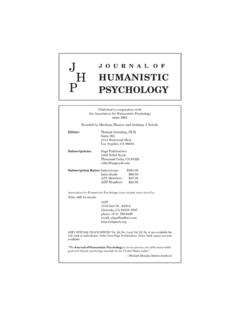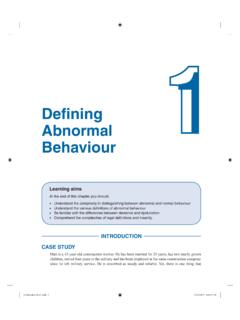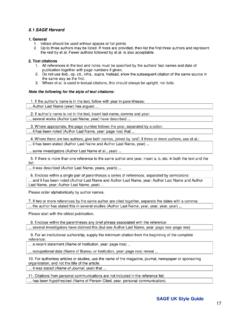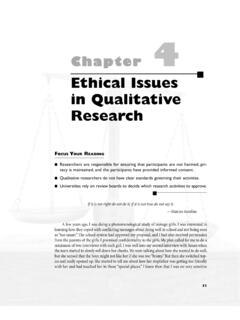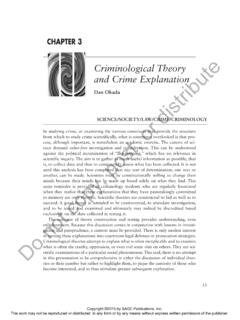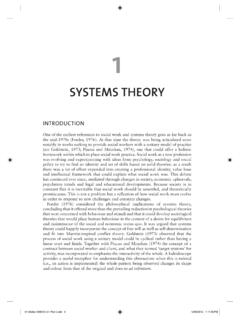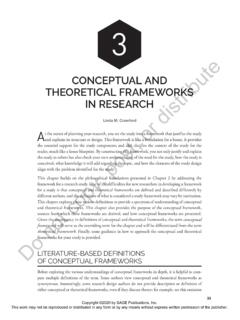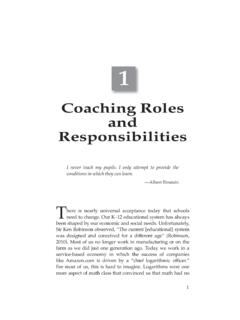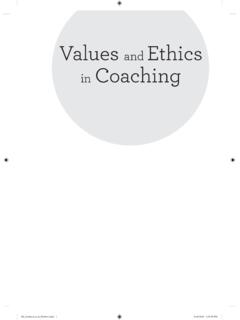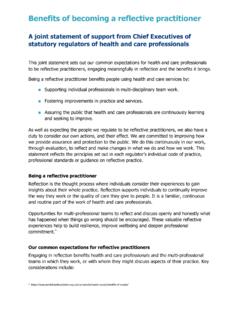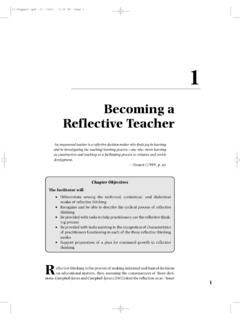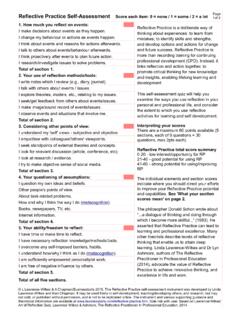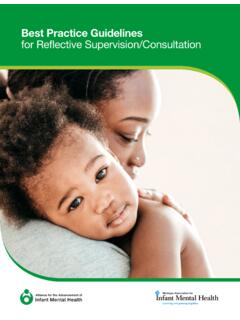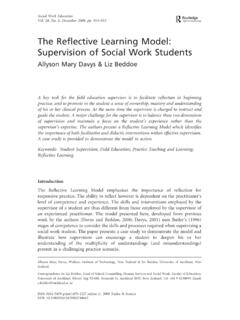Transcription of Reflective Practice - SAGE Publications Ltd
1 FIFTH EDITIONR eflective Practice GILLIE BOLTON WITH RUSSELL DELDERFIELDW riting and Professional 31/18/2018 10:10:01 AMSAGE Publications Ltd1 Oliver s Yard 55 City RoadLondon EC1Y 1 SPSAGE Publications Teller RoadThousand Oaks, California 91320 SAGE Publications India Pvt LtdB 1/I 1 Mohan Cooperative Industrial AreaMathura RoadNew Delhi 110 044 SAGE Publications Asia-Pacific Pte Ltd3 Church Street#10-04 Samsung HubSingapore 049483 Editor: James ClarkAssistant editor: Robert PattersonProduction editor: Tom BedfordCopyeditor: Elaine LeekProofreader: Bryan CampbellIndexer: Martin HargreavesMarketing manager: Lorna PatkaiCover design: Sheila TongTypeset by: C&M Digitals (P) Ltd, Chennai, IndiaPrinted in the UK Gillie Bolton and Russell Delderfield 2018 First edition published 2000. Reprinted 2003 (twice), 2004 Second edition published 2005. Reprinted 2008, 2009 (twice)Third edition published 2010. Reprinted 2010, 2012, 2013 (twice)Fourth edition published 2014.
2 Reprinted 2015, 2017 (twice)Apart from any fair dealing for the purposes of research or private study, or criticism or review, as permitted under the Copyright, Designs and Patents Act, 1988, this publication may be reproduced, stored or transmitted in any form, or by any means, only with the prior permission in writing of the publishers, or in the case of reprographic reproduction, in accordance with the terms of licences issued by the Copyright Licensing Agency. Enquiries concerning reproduction outside those terms should be sent to the of Congress Control Number: 2017952666 British Library Cataloguing in Publication dataA catalogue record for this book is available from the British LibraryISBN 978-1-5264-1169-3 ISBN 978-1-5264-1170-9 (pbk)At SAGE we take sustainability seriously. Most of our products are printed in the UK using FSC papers and boards. When we print overseas we ensure sustainable papers are used as measured by the PREPS grading system.
3 We undertake an annual audit to monitor our 41/18/2018 10:10:01 AMDedicated to all who heal, care and is limited. Imagination encircles the world. (Albert Einstein)Try to love the questions themselves like locked rooms and like books that are written in a very foreign tongue. Do not now seek the answers, which cannot be given to you. Live the questions now. (Rainer Maria Rilke) 51/18/2018 10:10:01 61/18/2018 10:10:01 AMContentsAbout the Authors xiForeword, by Stephen Brookfield xiiPreface to the Fifth Edition xvAcknowledgements xviiiNew to this Edition xxKey Terms (Glossary) xxiOnline Resources xxiv 1 Reflective Practice : an Introduction 1 Donald Sch n s Swampy Lowlands 3 Seeking a Route 6 Reflection-In- and On- Practice : Our Map for the Swampy Lowlands 8 Reflection and Reflexivity: Demystification 9 Reflective Practice : a Political and Social Responsibility 13 Valuing diversity 16 Making Sense of Experience 16 Blocks and Limitations to Reflection 19 Understanding the Name: Reflective Practice 21 2 Values and Principles of Reflective Practice 25 What Are Ethical Values?
4 26 Values and Principles of Reflective Practice 71/18/2018 10:10:02 AMviii Reflective practiceCertain Uncertainty; Serious Playfulness; Unquestioning Questioning 29 Ethical Relationships 33 Ethics and Students 33 Ethics and Clients etc. 34 Challenging Emotions 35 Reflective Awareness: Responsibility, Authority and Boundaries 39 Mindfulness 40 Forgiveness 41 Risk and Safety 42 Safety, Risk and Boundaries on a Master s Course 43 Focus on Reflection 46 3 Theories and Contexts of Reflective Practice 51 Theories, Frameworks, Models of Reflection: Explanations 52 Altering Critical Perception 53 Single and Double Loops 55 Cycles and Spirals 56 Structured Questions 59 Hierarchical and Transformative Models 59 Theories, Frameworks, Models of Reflection: Application 60 Contexts of Reflective Practice 62 Personal Development Plans and Portfolios (PDP) 62E-portfolios 63 Video 66 Action Learning or Research 67 Methods from the Arts and Other Media 68 Developmental Processes Involving Reflective Practice .
5 Supervision 70 Mentoring 71Co-peer Mentoring 73 Paying Attention 75 4 The Power of Narrative 78 Reflective Practice Narratives 80 Narratives of Practice 83 Autobiographical Reflective Stories 85 Our Storied Nature 88 The Relationship Between Life-as-Lived and Narrative 91 From Uncritical Storymaking to Critical Reflective Narratives 81/18/2018 10:10:02 AMContents ix 5 Perspective 97 Perspective and Reflective Practice 97 The Narrator 100 Omniscient, Reliable and Unreliable Narrators 101 Ghosts and Shadows from the Past 103 Perspective and Truth; Fact and Fiction 104 Clients Confidentiality and Privacy 107 Using Genre to Develop Perspective 108 Fantasy, Folk Tale, Fable, Myth 109 Writing for Children 111 Parody 113 Poetry 114 6 The Power of Metaphor 121 What Is Metaphor? 124 Metaphor at Work 125 Using Metaphor to Develop Reflection and Reflexivity 128 Image and Reflection 133 7 Writing as Reflection 135 Writing to Learn 138 The Discipline of Writing 140 Finding the Writer s Voice 142 Writing about Events, or Abstract Musing 144 Perception and Questioning 147 Reading and Sharing Writing 150 Silence 153 Reflective Writing and Artistry 154 Writing: an Ancient Power 154 8 How to Do Reflective and Reflexive Writing 157 Introduction to Writing First Draft Reflections 157 Trust the Writing Hand 157 Suspend Your Disbelief 158 How to Start: the Five Stages 159 Stage 1: The Six-minute Write 159 Stage 2: The Incident, Narrative, Story 161 Stage 3: Read and Respond 165 Stage 4: Sharing Writing with a Peer(s) 168 Stage 5: Developing Writing 91/18/2018 10:10.
6 02 AMx Reflective practiceReflective Writing for Assignments 174 Developing the Five Stages 176 Lists 176 Unsent Letters 176 Dialogue to Develop Aspects of Ourselves 177 Internal Mentor 177 Internal Saboteur 179 Writer s Block 180 9 Reflective Practice Journals 183 Logs, Diaries and Journals 186 The Reflective Practice Journal: an Explanation 188 Reflective Practice Journals and Ethical Values 190 The Thing 191 Types of Writing 192 How to Write: the Four Stages 193 When, Where, For and with Whom to Write a Journal 198 Journals as a Course Element 200 Modelling Critical Reflexivity 20310 Assessment and Evaluation 205 Assessment of Reflective Practice Journals 207 Assessment: Queries, Problems and Pitfalls 208 Issues with Grading Reflective and Reflexive Writing 210 Assessment Solutions 211 Evaluation 21411 Reflective Writing and Team Development 219 The Growth of a Team 221 Some Boundaries 222 More Stories: Evaluation 223 More Team-Building Stories 22412 Reflection on Reflection 231 References 240 Index 101/18/2018 10:10:02 AM1 Reflective Practice : an IntroductionReflective Practice is introduced and described, its social and political responsibility outlined.
7 Donald Sch n s theory that reflection-in-, and on-action are essential to inform us how to work in conditions of uncertainty is outlined. Reflection and reflexivity, common blocks to them, and how to discover just what each practitioner needs to reflect upon, are defined and three methods we may learn wisdom: first, by reflection, which is noblest; second, by imitation, which is easiest; and third by experience, which is the bitterest. (Confucius, quoted in Hinett, 2002, p. v)There are in our existence spots of time /.. whence .. our mindsAre nourished and invisibly repaired; /.. Such momentsAre scattered everywhere. (Wordsworth, [1880] 2004, p. 208)How can we develop the practitioner from the Practice ? (GB)How can we know the dancer from the dance? (Yeats, 1962, p. 128) Reflective Practice is a state of mind, an ongoing attitude to life and work, the pearl grit in the oyster of Practice and education; danger lies in it being a separate curriculum element with a set of exercises.
8 Brookfield calls it 11/18/2018 10:09:57 AM2 Reflective Practice a reflexive habit .. second nature (2009). It enables us to make illuminative sense of where we are in our own Practice , and our relation to our profes-sion and our institution: we don t travel far with it. Yet it makes the difference between 20 years of experience and merely one year of experience repeated 20 times (Beaty, 1997, p. 8). Reflective Practice can enable (future) professionals to learn from experi-ence about: themselves; their studies, their work; the way they relate to home and work, significant others and wider society and culture; the way social and cultural structures ( institutions) are formed and control us. Indeed, having the ability to reflect is a key element of employability in today s professions (Wharton, 2017). Professionals face complex and unpre-dictable situations; they need complex and diverse Reflective and reflexive processes.
9 Engaging in these critically will be reflected in the quality of their work or studies (see Whelan and Gent, 2013). It brings greater unity and wholeness of experience to the practitioner and greater empathy between them and their client. Job satisfaction will increase, and work-related stress decrease (Alarcon and Lyons, 2011).Perhaps the most accessible form of freedom, the most subjectively enjoyed, and the most useful to human society consists of being good at your job and therefore taking pleasure in doing it I really believe that to live happily you have to have something to do, but it shouldn t be too easy, or else something to wish for, but not just any old wish; something there s a hope of achieving. (Levi, 1988, p. 139)If it wasn t for Reflective Practice , [stuff] would undoubtedly go around and around in my is much more helpful to get it out of my head and onto the paper and look feel I can genuinely ask my clients, unpick unpick unpick, cry, open up.
10 Because I have done it, I know what I am asking you to do is really difficult, but I also know that it is a really relate the clinical work to the theory in Reflective Practice , and that gives you that 360 knowing, now I understand what the book is talking about .( Reflective practitioners quoted in Collins, 2013, pp. 54, 83, 84, 88) Reflective Practice can give strategies to bring things out into the open, and frame appropriate and searching questions never asked before. It can provide relatively safe and confidential ways to explore and express expe-riences otherwise difficult or impossible to communicate. It can challenge assumptions, ideological illusions, damaging social and cultural biases, inequalities; and it questions personal behaviours that perhaps silence the 21/18/2018 10:09:57 AMReflective Practice : an introduction 3voices of others or otherwise marginalise them. This book consistently enables enquiry into: what we know and wish or need to explore further what we know but do not know we know what we do not know and want to know what we think, feel, believe, value, understand about our role and boundaries how our actions match up with what we believe how to value and take into account personal explore and experiment with difficult areas of experience, such as: how to perceive from others perspective how to value others perspective, however different they are from us what we can change in our context; how to work with what we cannot change how others perceive us, and their feelings and thoughts about events, and our actions why we become stressed, and its impact on life and Practice how to counteract seemingly given social, cultural and political know a great deal more than we are aware, absorbing information unwittingly.
